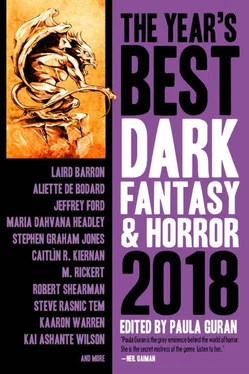The Strangos, sitting side-by-side on the couch in their matching dresses with knocked knees and wet socks, looked at each other, wide-eyed then clapped their hands; three quick claps.
“Goody,” said one.
“Yes, please,” said the other. “With cinnamon.”
Laurel liked cinnamon too. It made me sad to remember, though it did make the toast glitter pleasantly. I wished I had cocoa, but the Strangos didn’t seem to mind the Coke and one of them even commented favorably on the combination, saying she planned to make it a tradition. I’m not sure if she was serious. It is very difficult for me to differentiate between mockery and affection.
After the Strangos finished their snack we sat and stared at each other. I studied them closely for clues on how to proceed but when Strango One began picking her dress with long fingernails as though harvesting fleas, I began to fear my little party was in trouble. “Would you like to play charades?”
“How about hide-and-seek?” Strango One replied.
Personally, I never liked the game and didn’t see what it had to do with the holiday but in the spirit of being a good hostess, I agreed.
“You hide,” Strango One said.
I thought it unkind, to send me off alone while they counted to a thousand and five, yet they were guests and, as such, should be graciously accommodated. How strange it was, then, to be alone again in this new fashion; knowing there were those nearby who shared companionship while I had none. Even though they were Strangos, it made me lonely in a way I hadn’t been for a long time. Hearing their voices count together brought to mind the sound of Laurel and me reciting “The Night Before Christmas,” which we learned in its entirety in second grade. The memory only made me want to create more distance between me and the Strangos. I crept up the stairs; careful to skip the third from the top. The sound of their counting became a murmur that reminded me of waking in my bedroom when I was young, listening to the sounds my parents made.
What had I been thinking? Why had I invited Strangos into my house?
Before then it had never occurred to me to enter the forbidden attic, but it offered a perfect hiding place; its narrow door blended neatly with the paneled wood and the small hole that once housed a doorknob appeared to be a whorl. It was off limits when I was a child, the occasional source of strange noises my father attributed to ghosts, though I had seen him take my brother up there and knew the moans belonged to him. I stood at the bottom of the jagged staircase, looking up the dark portal with the odd feeling of assessing a giant jigsaw piece, memorizing it before pulling the door shut and slowly walking up the stairs, imagining all sorts of frightening things like mice and bats, spiders, and the like.
The attic was surprisingly small and, once I adjusted, cozy in a way. As a child I often “played mole,” rolling up in a blanket and hiding in my bedroom closet; it made sense that I enjoyed the confined space with its low slanted ceiling jutted at odd angles over inviting corners. There wasn’t much up there—an old bed, broken lamps, boxes filled with tools—but it was surprisingly warm. I sat, leaning against the wall and felt something like happiness, or what I remembered of it. “See Dad,” I whispered. “I always knew it was you,” which led to tears that surprised me with their sudden, inexplicable arrival.
The single, old window offered a patch of bruised sky I stared at; finally hypnotized into a slumber until revived by a luminescence that filled the room with a holy glow. “Laurel?” I whispered, but did not wait for a flicker of acknowledgment; instead, I turned away, curled into the reassuring crook of my elbow. For some, hope is an annihilation; a greater loss than the loss from which it is born.
I don’t know how long I slept, but when I awoke the attic was consumed by darkness, there was an uncomfortable crick in my neck and my knees ached as I carefully unwound myself. I bumped my shin on my way across the room, maneuvered carefully down the stairs, suspecting the Strangos were long gone; if I fell and hit my head I would likely die and be decomposed before anyone even noticed I was missing.
What a mess the Strangos made! The house was in chaos; furniture moved, lamps unplugged, cupboards left open. What, I wondered, did the Strangos think I had shrunk myself small as a pin—the refrigerator drawers drawn full to reveal a pale head of lettuce, carrots and eggs thrown to the floor—before I accepted they had not been guests, but invaders. I closed the drawers, tidied up as one does, returned each thing that could be returned to its rightful place and tossed what was ruined; when my eyes fell to an errant orange, an orb of brilliance I plucked from its shadowed corner and peeled, getting skin beneath my nails as the bright spiral fell against the white porcelain. I wiped my tears with orange scented fingertips, finally understanding the answer I had been given: the sweet taste, the holy glow, the great loss and widening absence; to be robbed day-after-day, month-after- month, year-after-year; left to fall deeper into the void, find an orange there, and destroy it.
Swift to Chase
Laird Barron
In medias res part II:
After a hard chase and all-too brief struggle, the Bird Woman of the Adirondacks loomed over me; demonic silhouette, blackest outspread wings tipped in iron; gore-crested and flint-beaked. Her thumbnail-talon poised to spike me through the left eye.
“To know itself, the universe must drink the blood of its children.” Her voice cracked like an ice shelf collapsing; it roared across an improbable expanse of inches.
The talon pressed against my iris. It went in and in.
Rewind and power dive from the clouds. Join the story, in medias res, part I :
Where in the world is Jessica Mace? That scene when the superlative secret agent gets captured inside the master villain’s lair is where. Instead of a secret agent, here’s little old me doing my best impression. Rather than a rocket station beneath a dormant volcano, I’d gotten trapped on an estate (1960s Philip K. Dick-esque) nestled among the peaks of the Adirondacks. Cue jazzy intro music; cue rhinestone heels and a dress slit to here . My nemesis, billionaire avian enthusiast and casual murderer of humans, Averna Spencer, wasn’t playing. Except she was playing.
First clue of my imminent demise (more like the fifth or sixth clue, but just go with it): a leather-bound copy of The Most Dangerous Game parked on the nightstand of my quarters. Second clue? The woman herself said over the intercom, “Fly, my swift, my sweet. When I catch you, I’m giving you a blood eagle.”
Viking history isn’t my specialty, but I know enough to not want one.
There I sat, dressed to kill or be killed. The loaner evening gown was a trap. Spencer had set it when she laid the fancy box across the sheets of the poster bed, and I sprang it as I slipped the dress on. Bird-of-paradise-crimson, gilded with streaks of gold and blue, a bronze torc to cover the scar on my neck (so thoughtful of my hostess), and four-inch rhinestone heels amounted to a costume worth more than I’d make in a lifetime unless that lifetime included a winning lotto ticket or sucking millionaire cock on the daily.
The ensemble transcended mere decoration; it reorganized my cells and worked outward like magma rushing through igneous channels. I’d stared at myself in the mirror and come face to face with a starlet. A tad hard-bitten. Close, though. Action heroine on the precipice of unfuckability by Hollywood’s standard. Regardless, the illusion of fabulous me radiated heat—live-wire alive.
Yep, slipping into the dress had been to stick my head right through a dangling snare. Call it the price of admission. Too late to change a damned thing that was coming. I grinned like a prizefighter to keep my gorge down. I’d been here before and survived. Double-edged blade, the notion of past as prologue, and so forth. Resilience in prey excited Averna and made her want me that much more.
Читать дальше












